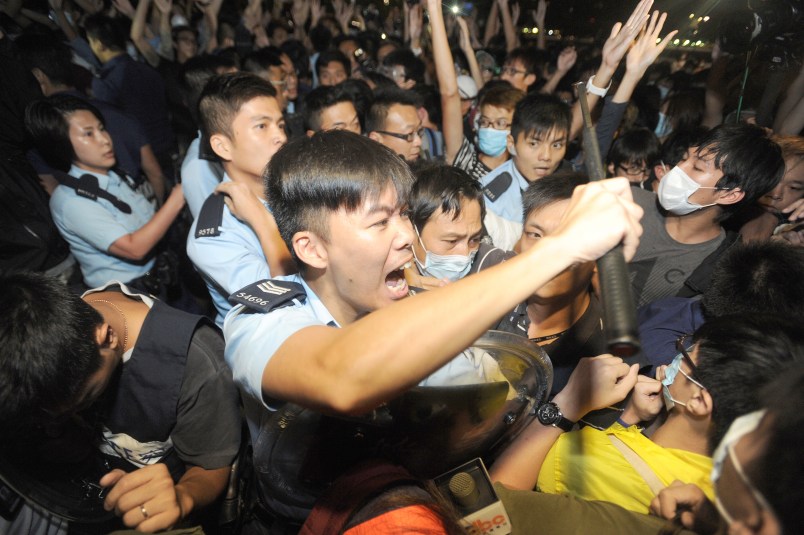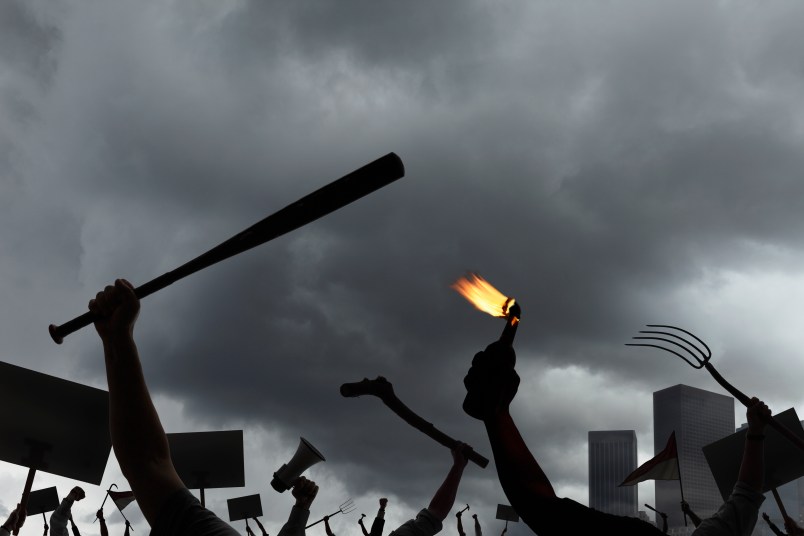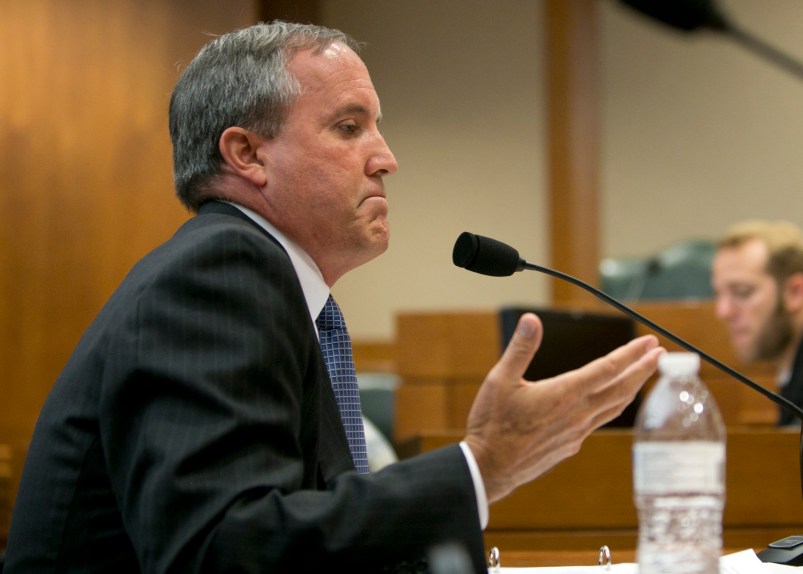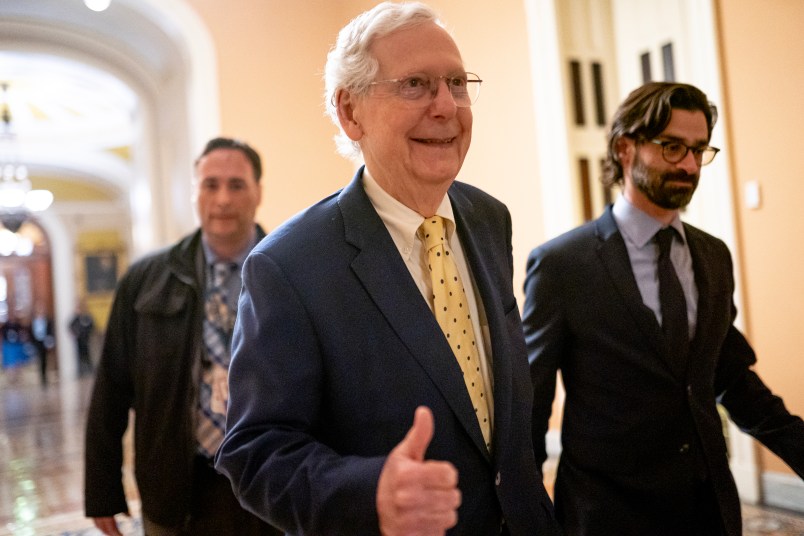Over the past couple of weeks, courageous ordinary citizens of Hong Kong are creating a whirlwind of momentum towards staking their claim for a more democratic Chinese society, finally getting another moment in the spotlight nearly 25 years after Tiananmen. Uncertainty rings through the streets of Hong Kong as authorities and protesters alike weigh next steps, as everyone knows that this demonstration will influence political and cultural life in China for years to come. What’s less talked about is how Hong Kong is not an isolated incident: It is joining the ranks of the other landmark participatory democracy movements of our time, a pattern of upheaval witnessed in Tunisia, Egypt, Thailand, Venezuela, and Ukraine.
Indeed, protests have raged from Ferguson to Mexico and South Africa to France just in the last week. While they appear to be randomized blips on a map, this growing trend of unrest is actually a part of an ever-connected global movement for truly people-powered, open societies that, if successful, can shift not just geopolitics but our fundamental ability to achieve human rights, development, equality, and prosperity in every community around the world.
But, there’s another side to all of this people-powered hope: An inability to ultimately convert all of this momentum into real change.
We’ve seen it before with the Muslim Brotherhood and then the military takeover of Egypt after the promise of democracy in Egypt. The million-person protest in Brazil of last summer has fizzled, leaving lower transportation prices but also rampant corruption. Erdogan of Turkey is as powerful as ever, even in the wake of the Gezi protests.
What if there was an easier way to keep people engaged? So that they don’t turn around and go home the minute things get hard or they get the immediate thing that they want? And, what if there was a way for all of us, standing around watching them, to actually add power to their work?
Well, in looking at the most successful movements of the last century—Indian democracy, civil rights, women’s enfranchisement, and LGBT rights—it turns out the core ingredients are the same. Yet, we are facing a crisis: a historic number of people want to participate in fighting injustice with unprecedented potential for societal change, yet we lack the infrastructure to access and scale the key principles, skills, and strategies inherent in all successful movements. As a result, efforts for change are often reduced to protests that disappear as quickly as they appear or antiquated voting systems that are frequently rigged and only allow for input every few years—neither of which are adequate solutions.
I was serving as the Youth Advisor at the U.S. Agency for International Development when the Arab Spring exploded, and I watched as the U.S. Government and civil society alike froze, relatively paralyzed in their ability to help the progressive, democratic forces fighting for their rights across the Middle East. We literally had no idea how to engage with the good guys on this, how to support them effectively.
The catalysts of the Arab Spring aren’t alone. There are catalytic leaders in every community, every country around the world. They are people with the courage to stand up to injustice and take the first steps in enacting change at all levels of society, largely by engaging others to join them. That’s the ways of Gandhi, MLK, Harvey Milk, and, as we’ve seen, Malala.
We need better ways to engage these catalysts but also ensure that the movements behind them succeed, that we have more fights that end on the side of people-power and true open, participatory democracy. Strong, reinforcing communities can create catalytic change, which is why we must invest in them.
That’s why I started Rhize to help catalytic leaders get the resources they need to be more impactful, faster, by building a vast international community of allies—including some of the top movement-building talent in the world—that can coach, train, and amplify the work of social movements. We’re building onramps for more people to get involved by paving avenues for more and more people to participate in the change they want to see. We’re building a global network of allies, people who may not self-identify as activists but have a voice, donations and skills and expertise that they can lend to support these movements.
The idea is that different social movements only have so much capacity, but collectively, as a global community, we have even more.
Mohammad Ayoub is a psychologist turned activist building a movement across Lebanon for citizens to gain access to public spaces. A movement for parks sounds mundane to your everyday Westerner, but to a Beirut resident, it can literally be gamechanging. Imagine a city with no place to picnic or run outside of busy streets. And yet, Beirut has a park the size of Central Park, located in the middle of the city that’s been closed off to the public for two decades for no real reason at all—other than to prevent social cohesion that could perhaps lead to a questioning of the government.
So, Mohammad and some friends launched a successful campaign last year to force the Government of Beirut to open Horsch Beirut. While the government agreed to open it, they have taken few steps to deliver on this promise. So Mohammad and his group, Nahnoo, are launching another offensive. Rhize has supported Mohammad through training, coaching and social media strategy around the campaign. But, we have also activated our allies network to help call out the Governor of Beirut to let him know that people beyond those in Beirut are watching.
It’s a grand experiment, but we have to start somewhere. We can’t be caught with our pants down for another Arab Spring, another Gezi, another Umbrella Revolution. And, in the words of our most recent Nobel Laureate, “Why should [we] wait for someone else? Why can’t we take a step and move forward,” and not just stand around.
Rhize has launched a crowdfunding campaign so that we can provide in-country support to Mohammad and others like him around the world. With more support, we can help direct more people to add capacity to important movements we’ve begun to support like women’s equality in Rwanda and LGBT rights in Cameroon, disability rights in India and ending sexual assault in the US. So, join us and this growing movement for more participatory, open and people-powered spaces.
Erin Mazursky is a fellow with the Truman National Security Project and the President and Co-Founder of Rhize.









